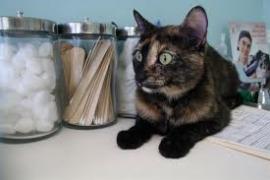Dogs, cats and blood pressure

Dogs, cats and blood pressure
When you visit the doctor, before our physician comes into an examination room, a nurse measures our weight, temperature and blood pressure. When your pet goes to the veterinarian, the veterinary technician comes in to take his weight and temperature, but not blood pressure. Does this mean blood pressure is not important in dogs and cats?
Blood pressure measurement is important in our pets, but in a different way than in humans. As many as one-in-four Americans suffers from high blood pressure and most may not even know it. Hypertension, aptly named the silent killer causes heart attacks, strokes and kidney disease.
Smoking, drinking and obesity increase our risk of developing hypertension. Some of us are prone to developing hypertension even without smoking, drinking or eating too much due to a predisposition in our genetic profile. Pets become hypertensive from completely different medical conditions.
Pets have different risks
Genetics is the first point where we and our pets differ with regard to hypertension. Inherited hypertension is extremely rare in dogs and cats and because dogs and cats do not drink alcohol or use tobacco; these are not risk factors either. Obesity causes serious medical problems in pets, but not hypertension.
What causes pet hypertension?
The number one cause of hypertension in pets is one form or other of kidney disease. The normal kidney plays a critical role in controlling blood pressure. A diseased kidney can no longer perform well as a blood pressure regulator. Since we see more kidney disease in cats, we see more hypertension in cats, but I have a nice Wirehair Fox Terrier patient who has hypertension as a consequence of kidney disease. Hyperthyroidism, exclusively a feline disease, is another cause of hypertension. Finally, some rare tumors of the adrenal gland can cause hypertension, and I have seen only a small handful of pets with this type of hypertension.
Consequences of pet hypertension
Untreated hypertension causes serious problems in pets: strokes, heart enlargement and damage to the eye causing blindness. Controlling hypertension decreases the risk of these disorders.
Treatment is the same for everyone
If you have hypertension, your doctor has recommended lifestyle changes such as quitting smoking and losing weight. You will be prescribed drugs to decrease blood pressure and you may even be asked to monitor your blood pressure at home since some patients get nervous at the doctor’s office and suffer from “white coat” hypertension.
If your pet has hypertension, your veterinarian will recommend lifestyle changes such as a special kidney-friendly food. A common drug used to treat pets with hypertension is amlodipine, a drug also used in people with hypertension. Other treatments will be needed to manage kidney disease or an overactive thyroid gland. Finally, your veterinarian may ask you to monitor your pet’s blood pressure at home since pets also get white coat hypertension. The procedure is not very difficult and The Animal Medical Center has blood pressure monitors to lend pet owners for home monitoring. If you pet has hypertension, ask if home monitoring is necessary.


































